Here are my favorite poems about fruits categorized:
- Poems on fruits for kindergarten
- Poems about fruit trees
- Fruit poems that rhyme
- Poems about fruits and vegetables
So if you want the best poems about fruits, then you’re in the right place.
Let’s get into it!
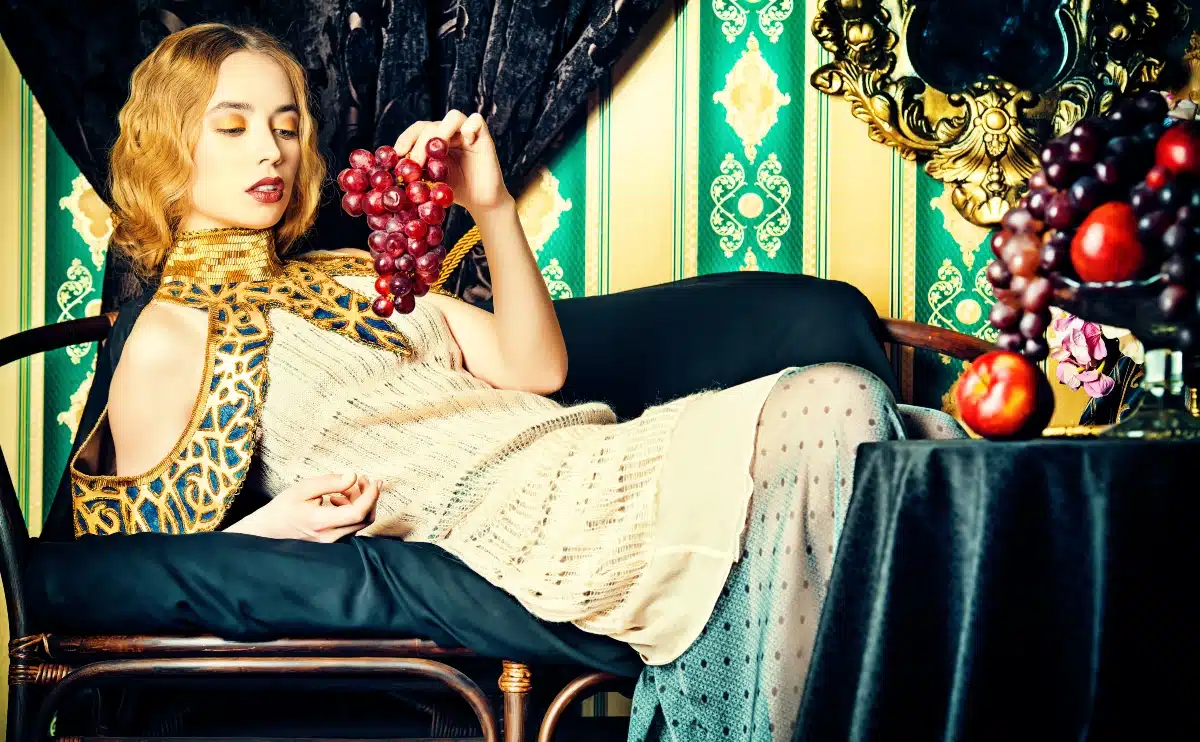
Mouth-Watering Poems About Fruits
Plunge into a collection of the most vibrant poems about fruits, diligently arranged for your poetic adventure.
Whether you’re seeking works that delve into the luscious allure of their colors and tastes, or reflect on the symbolism these natural delights carry across cultures, our anthology provides a diverse range of enticing examples.
With our meticulously curated selection, the best poems about fruits are all conveniently gathered in one place.
So, take a moment to explore and savor the beauty and richness of these verses that have inspired poets throughout history!
Let’s embark on this poetic journey into the heart of nature’s bountiful gifts!
My #1 Favorite Poem About Fruits
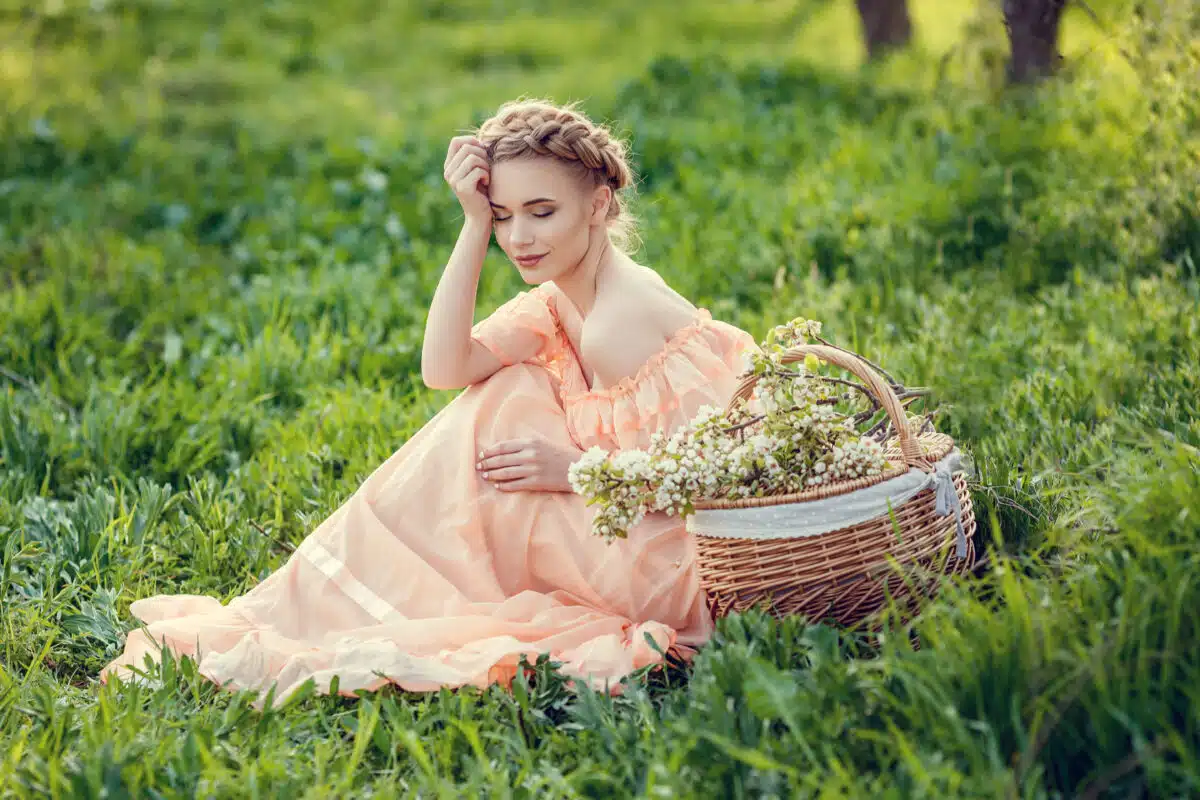
“The Garden” by Ralph Waldo Emerson
Many things the garden shows,
And pleased I stray
From tree to tree
Watching the white pear-bloom,
Bee-infested quince or plum.
I could walk days, years, away
Till the slow ripening, secular tree
Had reached its fruiting-time,
Nor think it long.
Solar insect on the wing
In the garden murmuring,
Soothing with thy summer horn
Swains by winter pinched and worn.
Poems on Fruits for Kindergarten
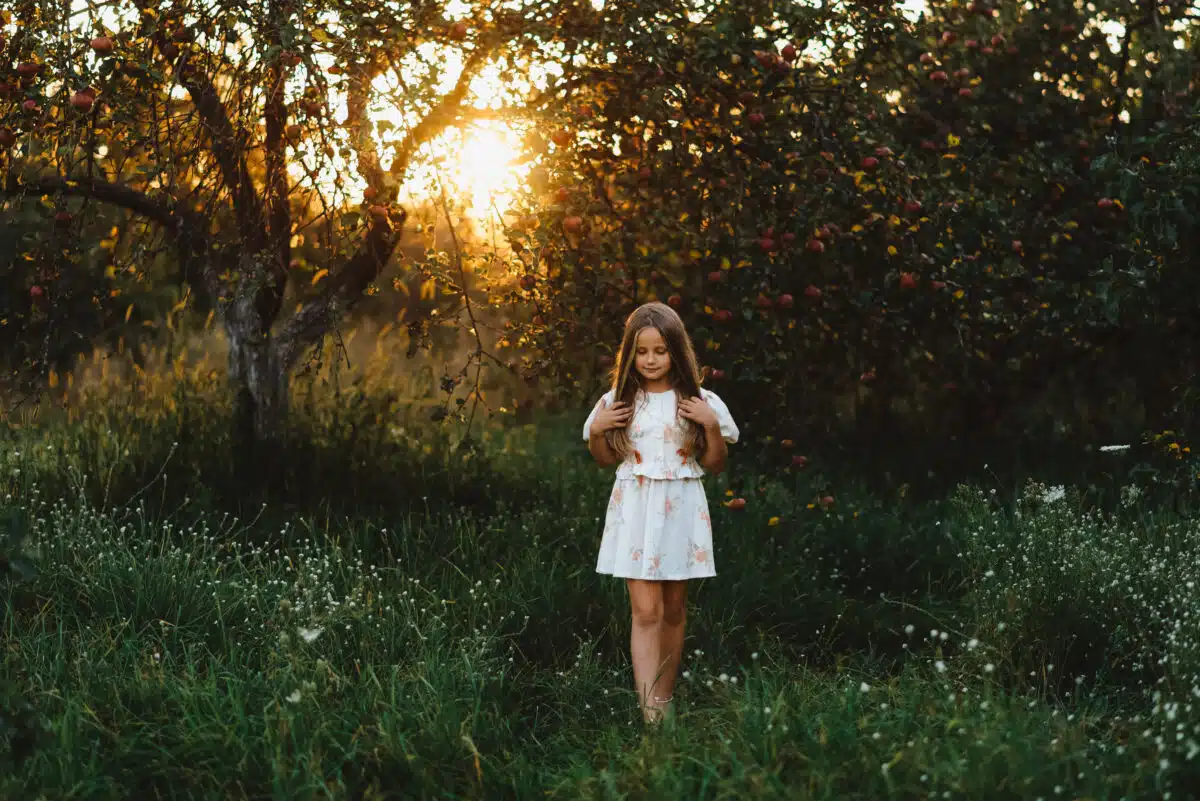
“Little Wild Strawberry” by Elizabeth Gordon
Little Wild Strawberry came down
To visit with her folks in town;
She’s a sweet child with charming ways
And blushes modestly at praise.
“Here’s Apple” by Elizabeth Gordon
Here’s Apple, loved by young and old
And sometimes worth his weight in gold.
We hail him with delighted cries
When he comes to us, baked in pies.
“Cherry Ripe” by Robert Herrick
Cherry-ripe, ripe, ripe, I cry,
Full and fair ones; come, and buy:
If so be you ask me where
They do grow? I answer, there
Where my Julia’s lips do smile;
There’s the land, or cherry-isle;
Whose plantations fully show
All the year where cherries grow.
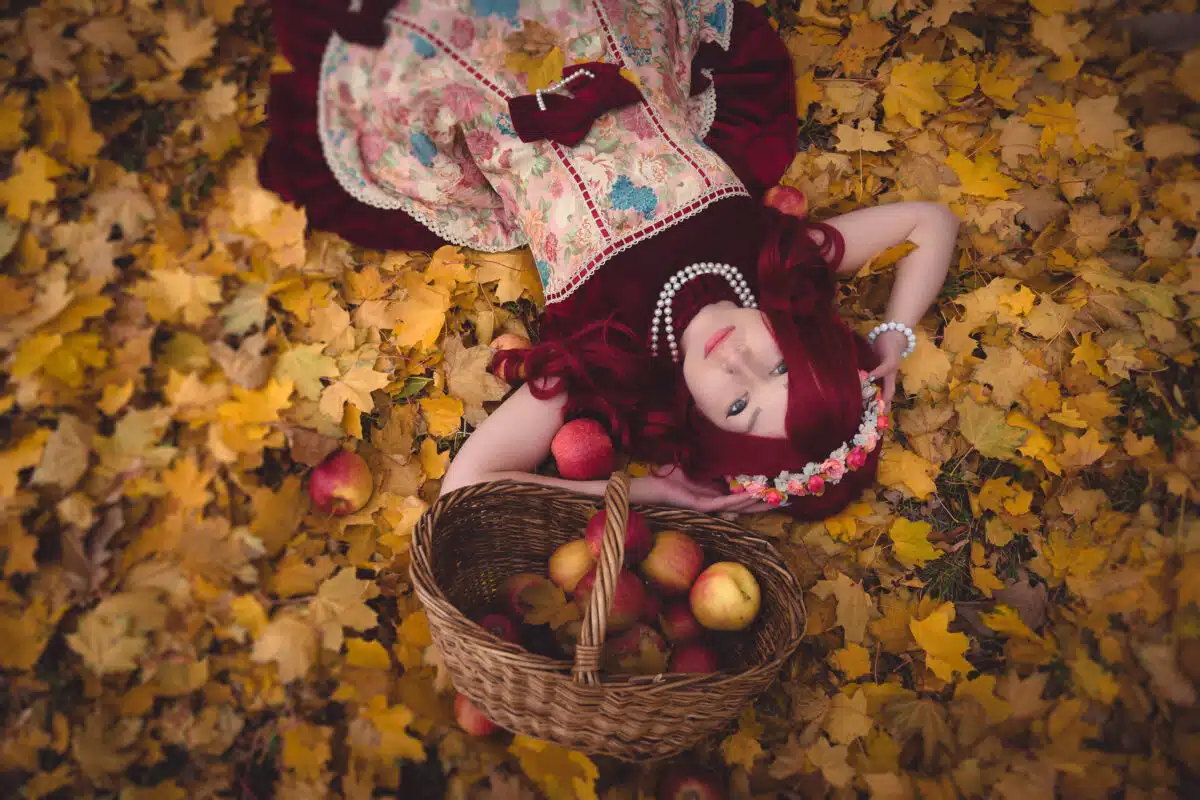
“Autumn Song” by Alma L. Kriege
Every fruit is mellow,
Every field is yellow,
Summer days are gone;
Leaves the ground are strewing,
Cooler winds are blowing
Autumn has begun.
Clustered grapes hang sleeping,
Where the winds soft creeping,
Lift their leafy shade;
See the pears are ripening,
Golden apples deep’ning
Into blushing red.
“Cherry-Time” by Robert von Ranke Graves
Cherries of the night are riper
Than the cherries pluckt at noon
Gather to your fairy piper
When he pipes his magic tune:
Merry, merry,
Take a cherry;
Mine are sounder,
Mine are rounder,
Mine are sweeter
For the eater
Under the moon.
And you’ll be fairies soon.
In the cherry pluckt at night,
With the dew of summer swelling,
There’s a juice of pure delight,
Cool, dark, sweet, divinely smelling.
Merry, merry,
Take a cherry;
Mine are sounder,
Mine are rounder
Mine are sweeter
For the eater
In the moonlight.
And you’ll be fairies quite.
When I sound the fairy call,
Gather here in silent meeting,
Chin to knee on the orchard wall,
Cooled with dew and cherries eating.
Merry, merry,
Take a cherry;
Mine are sounder,
Mine are rounder,
Mine are sweeter.
For the eater
When the dews fall.
And you’ll be fairies all.
“Pineapple” by Elizabeth Gordon
Pinenapple has so many “eyes”
You cannot take him by surprise;
He’s full of sunshine, through and through,
And always has a treat for you.
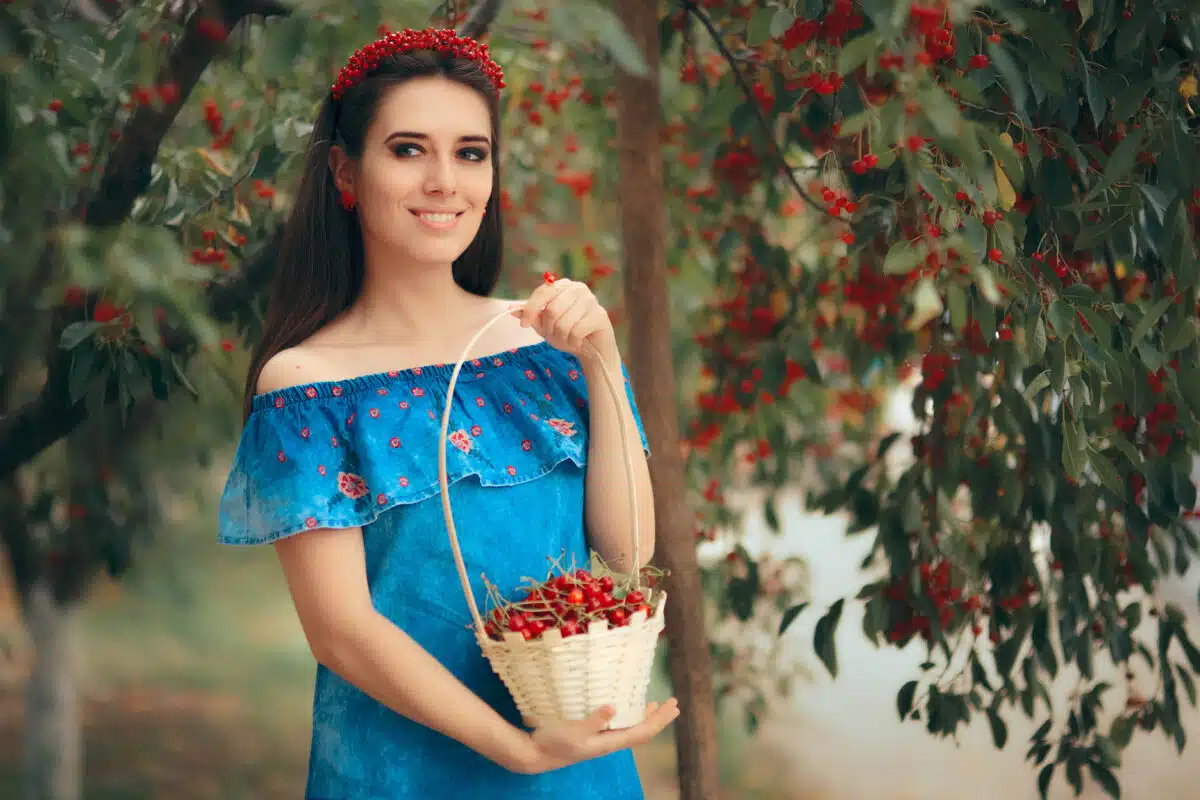
“Playing at bob cherry” by Christina Georgina Rossetti
Playing at bob cherry
Tom and Nell and Hugh:
Cherry bob! cherry bob!
There’s a bob for you.
Tom bobs a cherry
For gaping snapping Hugh,
While curly-pated Nelly
Snaps at it too.
Look, look, look—
O what a sight to see!
The wind is playing cherry bob
With the cherry tree.
“Banana” by Elizabeth Gordon
Banana wears a yellow coat
Buttoned quite snugly ’round his throat.
He comes from where it’s warm, you see,
And feels cold more than you or me.
“Citron” by Elizabeth Gordon
Citron is very plump and round,
He likes to roll upon the ground;
Come rain or shine he’s always happy,
A nice, contented little chappie.

“The peach tree on the southern wall” by Christina Georgina Rossetti
The peach tree on the southern wall
Has basked so long beneath the sun,
Her score of peaches great and small
Bloom rosy, every one.
A peach for brothers, one for each,
A peach for you and a peach for me;
But the biggest, rosiest, downiest peach
For Grandmamma with her tea.
“Currants on a bush” by Christina Georgina Rossetti
Currants on a bush,
And figs upon a stem,
And cherries on a bending bough,
And Ned to gather them.
“The Blackberry” by Elizabeth Gordon
The Blackberry children love to run
And play beneath the August sun
Until each little maid and man
Takes on a friendly coat of tan.
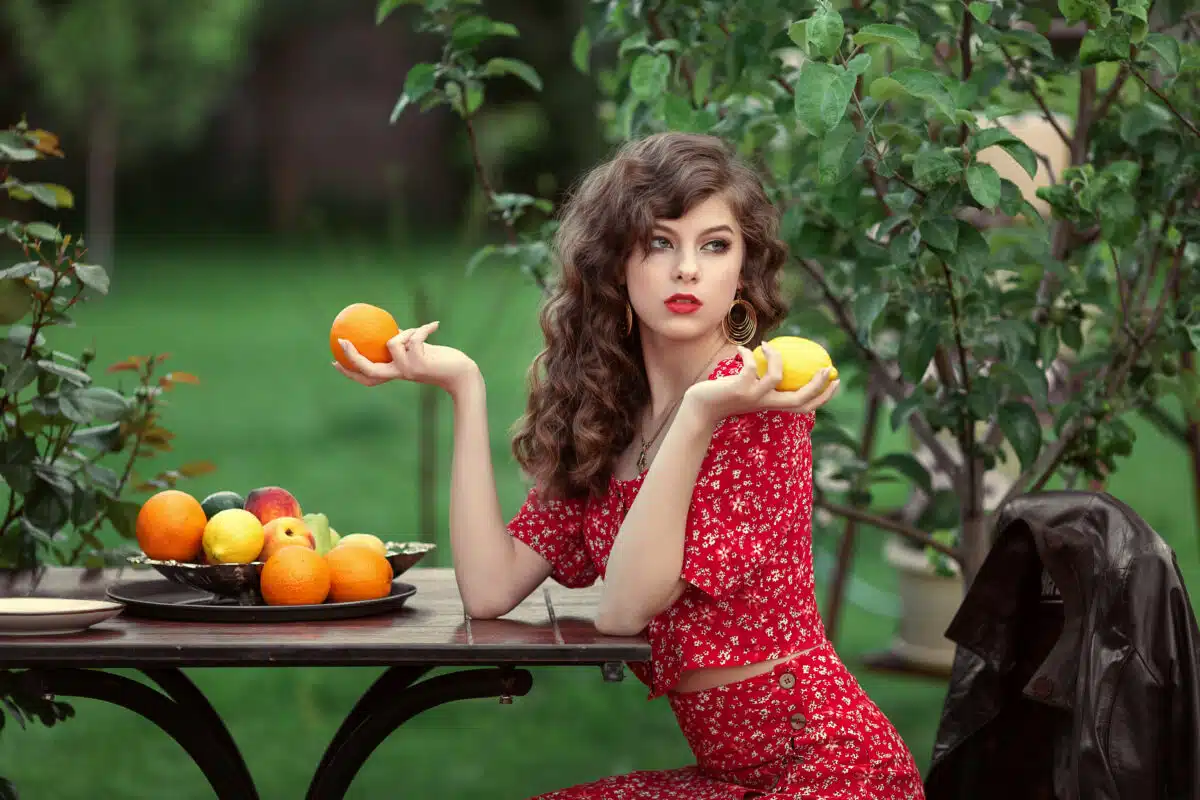
“The Lemons” by Elizabeth Gordon
The Lemons every summer go
In groups to see the Wild West Show;
Come rain or shine, they never stay
At home on any circus day.
“Mother shake the cherry-tree” by Christina Georgina Rossetti
Mother shake the cherry-tree,
Susan catch a cherry;
Oh how funny that will be,
Let’s be merry!
One for brother, one for sister,
Two for mother more,
Six for father, hot and tired,
Knocking at the door.
“Rushes in a watery place” by Christina Georgina Rossetti
Rushes in a watery place,
And reeds in a hollow;
A soaring skylark in the sky,
A darting swallow;
And where pale blossom used to hang
Ripe fruit to follow.
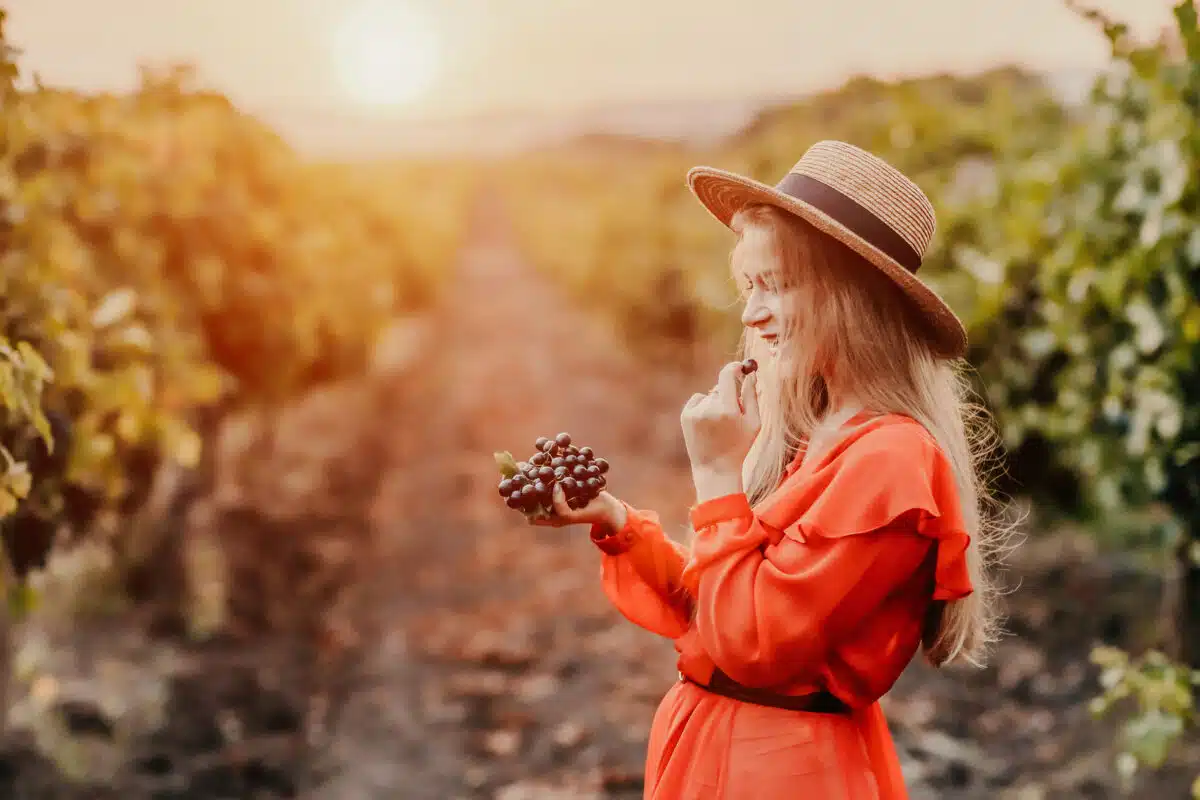
“Wild Grape” by Elizabeth Gordon
Wild Grape just loves to run away
And in the green woods climb and play;
You’ll know him when among the trees
His fragrant blossoms scent the breeze.
“Raspberry” by Elizabeth Gordon
“Good morning, friends! Know who I am?
I’m Raspberry who makes the jam;
You know—that on the pantry shelf—
I make that every year myself.”
“Pomegranate” by Elizabeth Gordon
A foreign lady of renown—
Pomegranate in her crimson gown,
Smiling and nodding as she goes,
Looks like an Oriental rose.
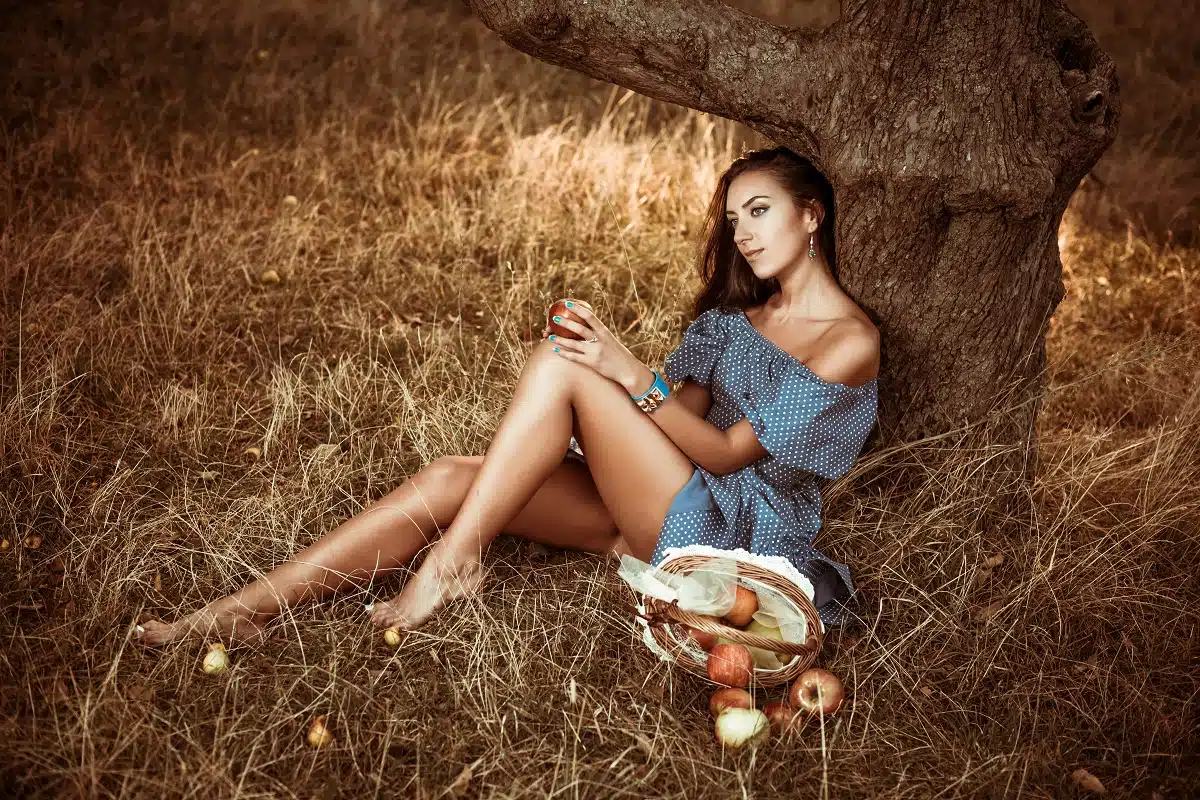
“Apples” from Summer Songs
Down! down! down!
Down, under the tree,
See the apples falling,
As ripe as they can be.
Beautiful golden apples,
Yellow, brown, and red;
Down, down they fall in showers,
And over the green grass spread.
Come, little girls and boys,
Leave your books and play;
Help to gather the apples—
No more school to-day.
Fill your hats and aprons,
Shake the tree again!
See, they fall around you,
Like the summer rain.
Some take into the kitchen,
Heap the basket high;
Cook, your paste get ready,
Make us an apple pie.
Some are meant for cider
Those leave under the tree,
To make them ripe and mellow,
As cider-apples should be.
Some we’ll keep till Winter,
Till the merry Christmas days,
When friends are met together
Around the bright wood blaze.
So, help and gather the apples,
Working while you play;
Put away the lessons
No more school to-day.
“Plum” by Elizabeth Gordon
Hand in hand with summer comes
The happy family called the Plums,
Some dressed in purple, some in red;
They’re very pretty and well bred.
“Persimmon” by Elizabeth Gordon
Persimmon said: “I’m up so high
I can reach out and touch the sky.”
Bre’r Possum said: “Don’t reach too far,
You might put out a shining star.”
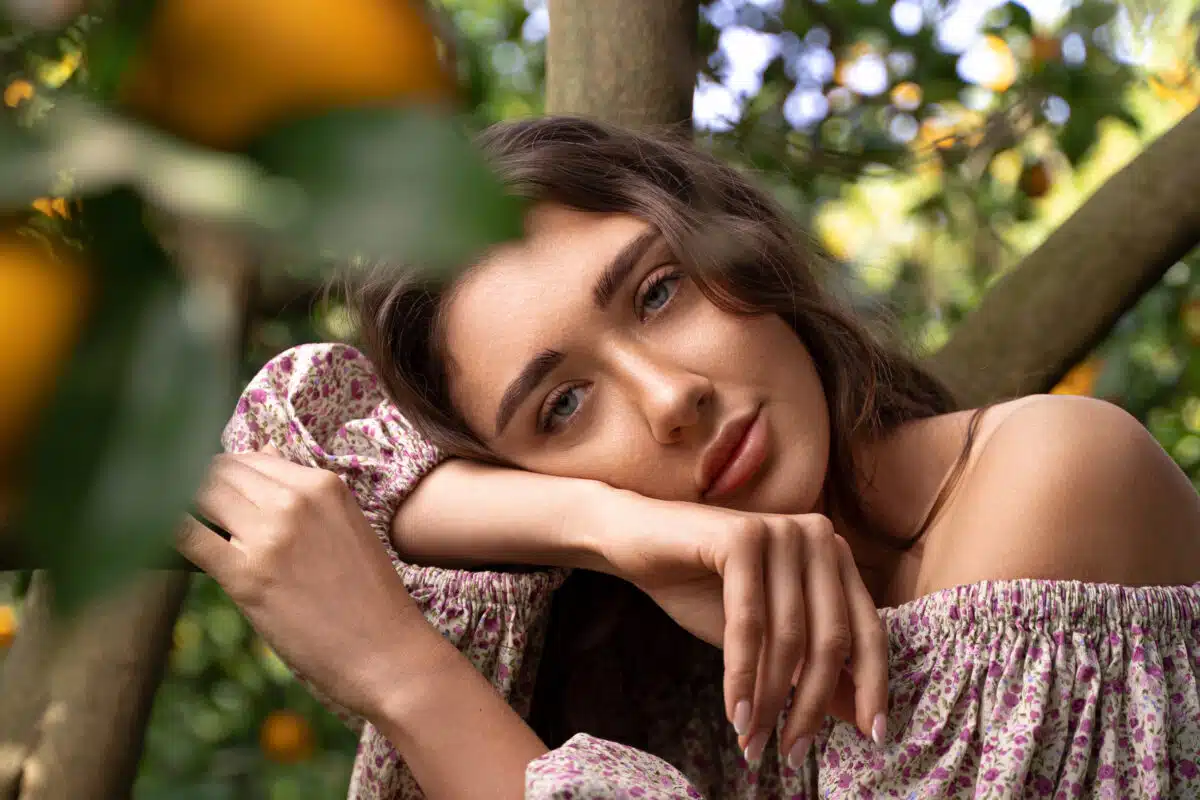
“Miss Orange” by Elizabeth Gordon
Miss Orange said: “I’d like to know
Those pretty mountain girls called ‘Snow;’”
“Don’t,” said her Dad, “or we are lost;
They’re relatives of Sir Jack Frost.”
“You shall have an Apple” by Walter Crane
You shall have an apple,
You shall have a plum,
You shall have a rattle-basket,
When papa comes home.
“Muskmelon” by Elizabeth Gordon
“Dear me!” Madam Muskmelon said,
“Those children will not stay in bed;
Before the darlings get misplaced
I’ll tie each baby to my waist.”
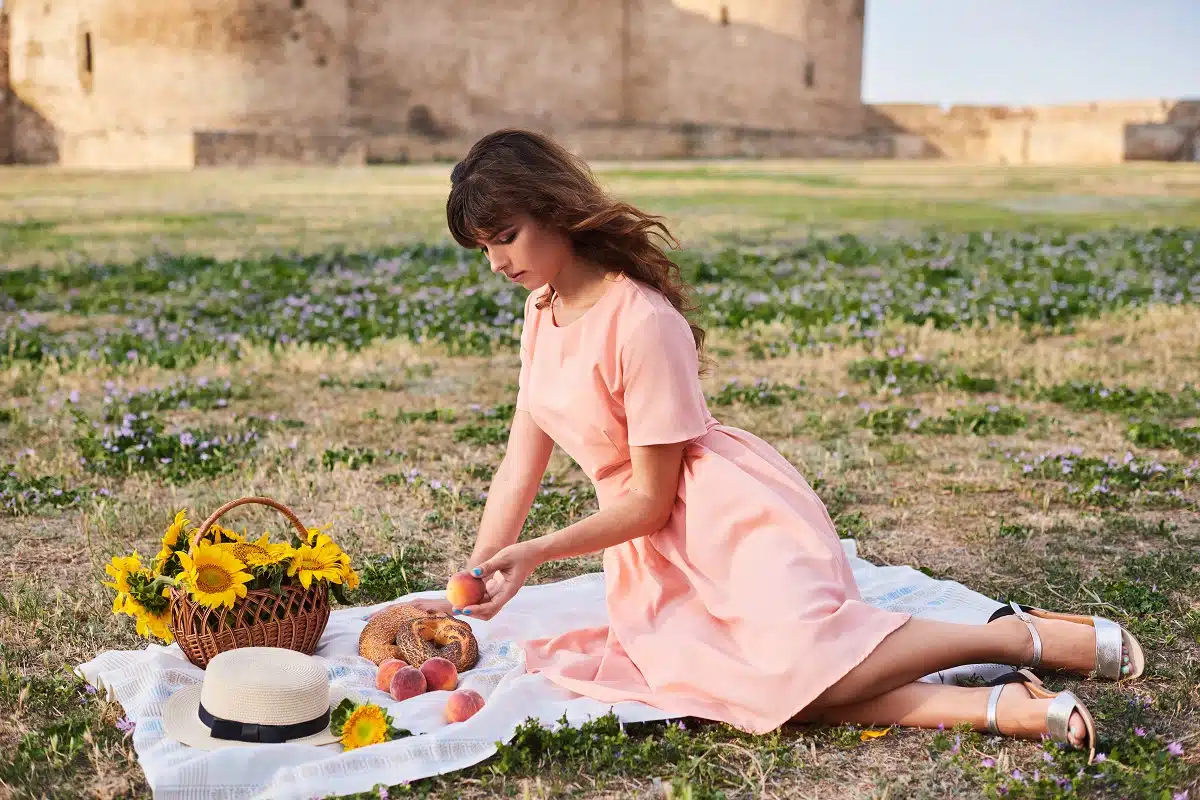
“Peach” by Elizabeth Gordon
“Our family’s not hard to suit,”
Said Mrs. Peach. “We’re simple fruit;
We like most any kind of weather
If the sun shines, and we’re together.”
“Freddie And The Cherry-Tree” by Walter Crane
Freddie saw some fine ripe cherries
Hanging on a cherry-tree,
And he said, “You pretty cherries,
Will you not come down to me?”
“Thank you kindly,” said a cherry,
“We would rather stay up here;
If we ventured down this morning,
You would eat us up, I fear.”
One, the finest of the cherries,
Dangled from a slender twig;
“You are beautiful,” said Freddie,
“Red and ripe, and oh, how big!”
“Catch me,” said the cherry, “catch me,
Little master, if you can.”
“I would catch you soon,” said Freddie,
“If I were a grown-up man.”
Freddie jumped, and tried to reach it,
Standing high upon his toes;
But the cherry bobbed about,
And laughed, and tickled Freddie’s nose.
Poems About Fruit Trees
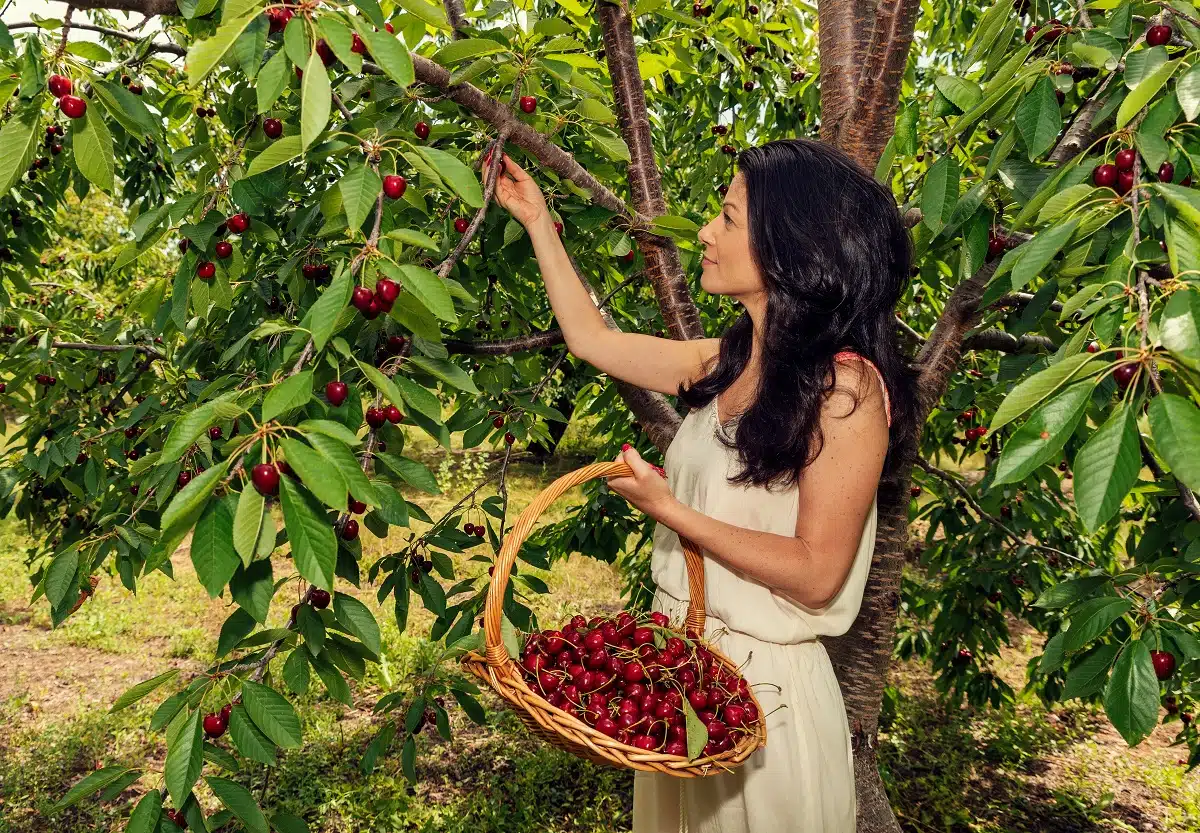
“Our English Home” by Mrs. C. B. Wilson
Oh! who would leave our happy land,
Where peace and plenty dwell,
To roam upon a foreign strand,
Whose wonders travellers tell?
The orangesheds its sweet perfume
Beneath Hispania’s skies;
But we’ve the apple’s ruddy bloom,
The orchard’s rich supplies!
The cocoa and the date-tree spread
Their boughs in India’s clime;
The yellow mango hangs o’er head,
And stately grows the lime;
But we’ve the cherry’s tempting bough,
The currant’s coral gem;
What English child will not allow
That these may vie with them?
Italy boasts its citron groves,
And walks of lemon trees;
Ceylon, its spicy nuts and cloves,
That scent the summer breeze.
But we’ve the peach, and nectarine red,
The ripe and blooming plum,
The strawberry, in its leafy bed,
When holidays are come.
Heaven on our favoured land hath smiled;
From want and war we’re free;
The noble’s heir, the peasant’s child,
Alike have liberty.
Grateful we’ll praise the mighty hand
That sheds such blessings here,
Protecting still our native land
From ills that others fear.
Still let us love this spot of earth
The best where’er we roam
And duly estimate the worth
Of our dear English home.
“The Priest And The Mulberry Tree” by T. L. Peacock
Did you hear of the curate who mounted his mare,
And merrily trotted along to the fair?
Of creature more tractable none ever heard,
In the height of her speed she would stop at a word;
But again with a word, when the curate said, Hey,
She put forth her mettle and galloped away.
As near to the gates of the city he rode,
While the sun of September all brilliantly glowed,
The good priest discovered, with eyes of desire,
A mulberry -tree in a hedge of wild briar;
On boughs long and lofty, in many a green shoot,
Hung, large, black, and glossy, the beautiful fruit.
The curate was hungry and thirsty to boot;
He shrunk from the thorns, though he longed for the fruit;
With a word he arrested his courser’s keen speed,
And he stood up erect on the back of his steed;
On the saddle he stood while the creature stood still ,
And he gathered the fruit till he took his good fill.
Sure never,’ he thought, ‘ was a creature so rare ,
So docile, so true, as my excellent mare;
Lo, here now I stand,’ and he gazed all around,
As safe and as steady as if on the ground;
Yet how had it been, if some traveller this way,
Had, dreaming no mischief, but chanced to cry, Hey?’
He stood with his head in the mulberry tree,
And he spoke out aloud in his fond reverie;
At the sound of the word the good mare made a push,
And down went the priest in the wild-briar bush.
He remembered too late, on his thorny green bed,
Much that well may be thought cannot wisely be said.
“The Apple Tree” by Hattie Howard
Has ever a tree from the earth upsprung
Around whose body have children clung,
Whose bounteous branches the birds among
Have pecked the fruit, and chirped and sung –
Was ever a tree, or shall there be,
So hardy, so sturdy, so good to see,
So welcome a boon to the family,
Like the pride of the farmer, the apple tree?
How he loves to be digging about its root,
Or grafting the bud in the tender shoot,
The daintiest palate that he may suit
With the fairest and finest selected fruit.
How he boasts of his Sweetings, so big for size;
His delicate Greenings – made for pies;
His Golden Pippins that take the prize,
The Astrachans tempting, that tell no lies.
How he learns of the squirrel a thing or two
That the wise little rodents always knew,
And never forget or fail to do,
Of laying up store for the winter through;
So he hollows a space in the mellow ground
Where leaves for lining and straw abound,
And well remembers his apple mound
When a day of scarcity comes around.
By many a token may we suppose
That the knowledge apple no longer grows,
That broke up Adam and Eve’s repose
And set the fashion of fig-leaf clothes;
The story’s simple and terse and crude,
But still with a morsel of truth imbued:
For of trees and trees by the multitude
Are some that are evil, and some that are good.
The more I muse on those stories old
The more philosophy they unfold
Of husbands docile and women bold,
And Satan’s purposes manifold;
Ah, many a couple halve their fare
With that mistaken and misfit air
That the world and all are ready to swear
To a mighty unapple-y mated pair.
The apple’s an old-fashioned tree I know,
All gnarled and bored by the curculio,
And loves to stand in a zigzag row;
And doesn’t make half so much of a show
As the lovely almond that blooms like a ball,
And spreads out wide like a pink parasol
Set on its stem by the garden-wall;
But I love the apple tree, after all.
“A little more cider” – sings the bard;
And who this juiciness would discard,
Though holding the apple in high regard,
Must be like the cider itself – very hard;
For the spirit within it, as all must know,
Is utterly harmless – unless we go
Like the fool in his folly, and overflow
By drinking a couple of barrels or so.
What of that apple beyond the seas,
Fruit of the famed Hesperides?
But dust and ashes compared to these
That grow on Columbia’s apple trees;
And I sigh for the apples of years agone:
For Rambos streaked like the morning dawn,
For Russets brown with their jackets on,
And aromatic as cinnamon.
Oh, the peach and cherry may have their place,
And the pear is fine in its stately grace;
The plum belongs to a puckery race
And maketh awry the mouth and face;
But I long to roam in the orchard free,
The dear old orchard that used to be,
And gather the beauties that dropped for me
From the bending boughs of the apple tree.

“The Palm-Tree” by John Greenleaf Whittier
Is it the palm, the cocoa-palm,
On the Indian Sea, by the isles of balm?
Or is it a ship in the breezeless calm?
A ship whose keel is of palm beneath,
Whose ribs of palm have a palm-bark sheath,
And a rudder of palm it steereth with.
Branches of palm are its spars and rails,
Fibres of palm are its woven sails,
And the rope is of palm that idly trails!
What does the good ship bear so well?
The cocoa-nut with its stony shell,
And the milky sap of its inner cell.
What are its jars, so smooth and fine,
But hollowed nuts, filled with oil and wine,
And the cabbage that ripens under the Line?
Who smokes his nargileh, cool and calm?
The master, whose cunning and skill could charm
Cargo and ship from the bounteous palm.
In the cabin he sits on a palm-mat soft,
From a beaker of palm his drink is quaffed,
And a palm-thatch shields from the sun aloft!
His dress is woven of palmy strands,
And he holds a palm-leaf scroll in his hands,
Traced with the Prophet’s wise commands!
The turban folded about his head
Was daintily wrought of the palm-leaf braid,
And the fan that cools him of palm was made.
Of threads of palm was the carpet spun
Whereon he kneels when the day is done,
And the foreheads of Islam are bowed as one!
To him the palm is a gift divine,
Wherein all uses of man combine,—
House, and raiment, and food, and wine!
And, in the hour of his great release,
His need of the palm shall only cease
With the shroud wherein he lieth in peace.
“Allah il Allah!” he sings his psalm,
On the Indian Sea, by the isles of balm;
“Thanks to Allah who gives the palm!”
“The Apple Tree” by William Kerr
Secret and wise as nature, like the wind
Melancholy or light-hearted without reason,
And like the waxing or the waning moon
Ever pale and lovely: you are like these
Because you are free and live by your own law;
While I, desiring life and half alive,
Dream, hope, regret and fear and blunder on.
Your beauty is your life and my content,
And I will liken you to an apple-tree,
Mary and Margaret playing under the branches,
And everywhere soft shadows like your eyes,
And scattered blossom like your little smiles.
From “Entering Glory” by Isaac Taylor
Or if we fancy groves of living trees,
Fringing the river’s side, and every breeze
Laden with aromatic sweets, and fruit
Fresh every month, etherial tastes to suit,
Life ever giving;
Still, these are things our senses here can know,
We’ve seen and tasted something like below:
Mere body’s joys, too mean for spirit’s fare;
We’re sure some higher, better things are there,
The life of living.
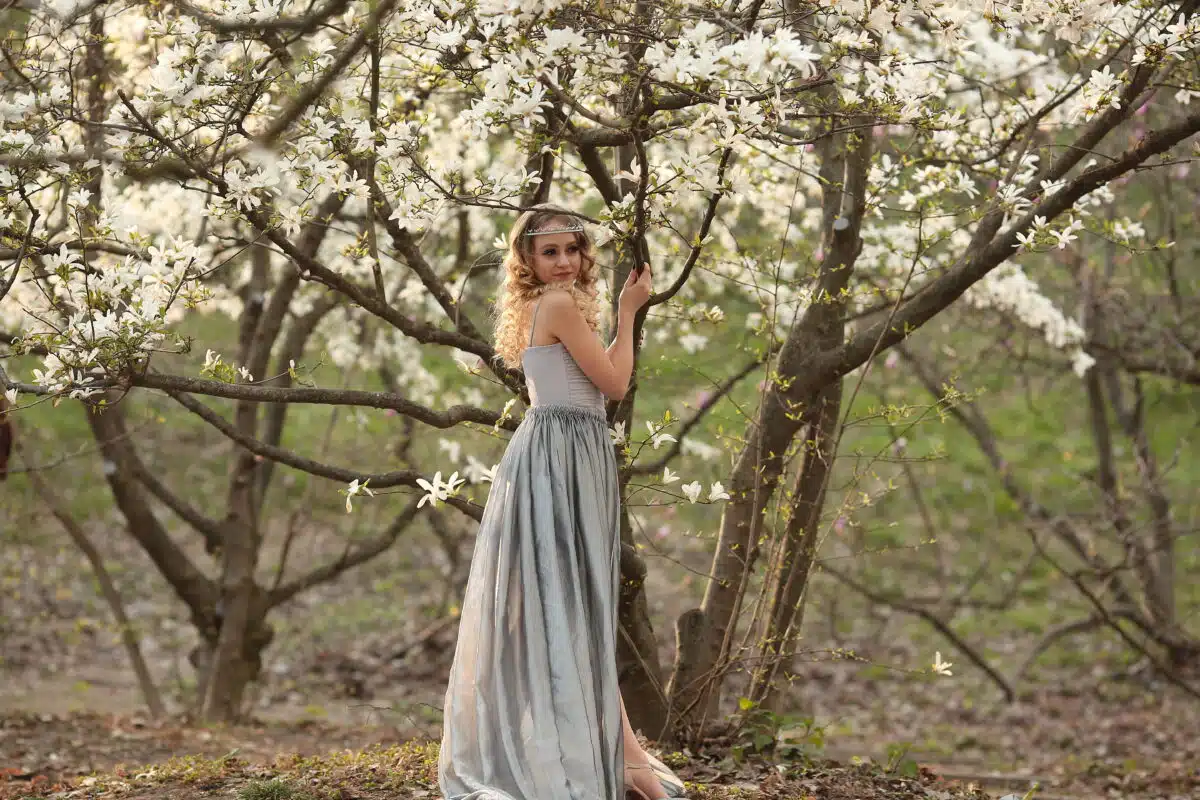
“The Voice of Spring” by Mary Howitt
I am coming, I am coming!
Hark! the little bee is humming;
See, the lark is soaring high
In the blue and sunny sky;
And the gnats are on the wing,
Wheeling round in airy ring.
See, the yellow catkins cover
All the slender willows over;
And on banks of mossy green
Star-like primroses are seen;
And, their clustering leaves below,
White and purple violets blow.
Hark! the new-born lambs are bleating,
And the cawing rooks are meeting
In the elms- a noisy crowd!
All the birds are singing loud;
And the first white butterfly
In the sunshine dances by.
Look around the look around!
Flowers in all the fields abound;
Every running stream is bright:
All the orchard trees are white,
And each small and waving shoot
Promises sweet flowers and fruit.
Turn thine eyes to earth and heaven!
God for thee the Spring has given,
Taught the birds their melodies,
Clothed the earth , and cleared the skies,
For thy pleasure, or thy food ,
Pour thy soul in gratitude!
“Robin Redbreast” by W. Allingham
Good-bye, good-bye to Summer!
For Summer’s nearly done;
The garden smiling faintly,
Cool breezes in the sun;
Our thrushes now are silent,
Our swallows flown away,
But Robin’s here in coat of brown,
And scarlet breast-knot gay.
Robin , Robin Redbreast,
O Robin dear!
Robin sings so sweetly
In the falling of the year.
Bright yellow, red, and orange,
The leaves come down in hosts;
The trees are Indian princes,
But soon they’ll turn to ghosts;
The leathery pears and apples
Hang russet on the bough;
It’s Autumn, Autumn, Autumn late,
‘Twill soon be Winter now.
Robin , Robin Redbreast,
O Robin dear!
And what will this poor Robin do?
For pinching days are near,
The fire- side for the cricket,
The wheatstack for the mouse,
When trembling night-winds whistle
And moan all round the house.
The frosty ways like iron,
The branches plumed with snow,
Alas ! in Winter dead and dark,
Where can poor Robin go?
Robin, Robin Redbreast,
O Robin dear!
And a crumb of bread for Robin,
His little heart to cheer.
From “Address To A Child, During A Boisterous Winter Evening” by Miss Wordsworth
As soon as ’tis daylight, to -morrow, with me
You shall go to the orchard, and then you
That he has been there, and made a great rout,
And cracked the branches, and strewn them about;
Heaven grant that he spare but that one upright twig
That looked up at the sky so proud and big
All last summer, as well you know,
Studded with apples, a beautiful show!
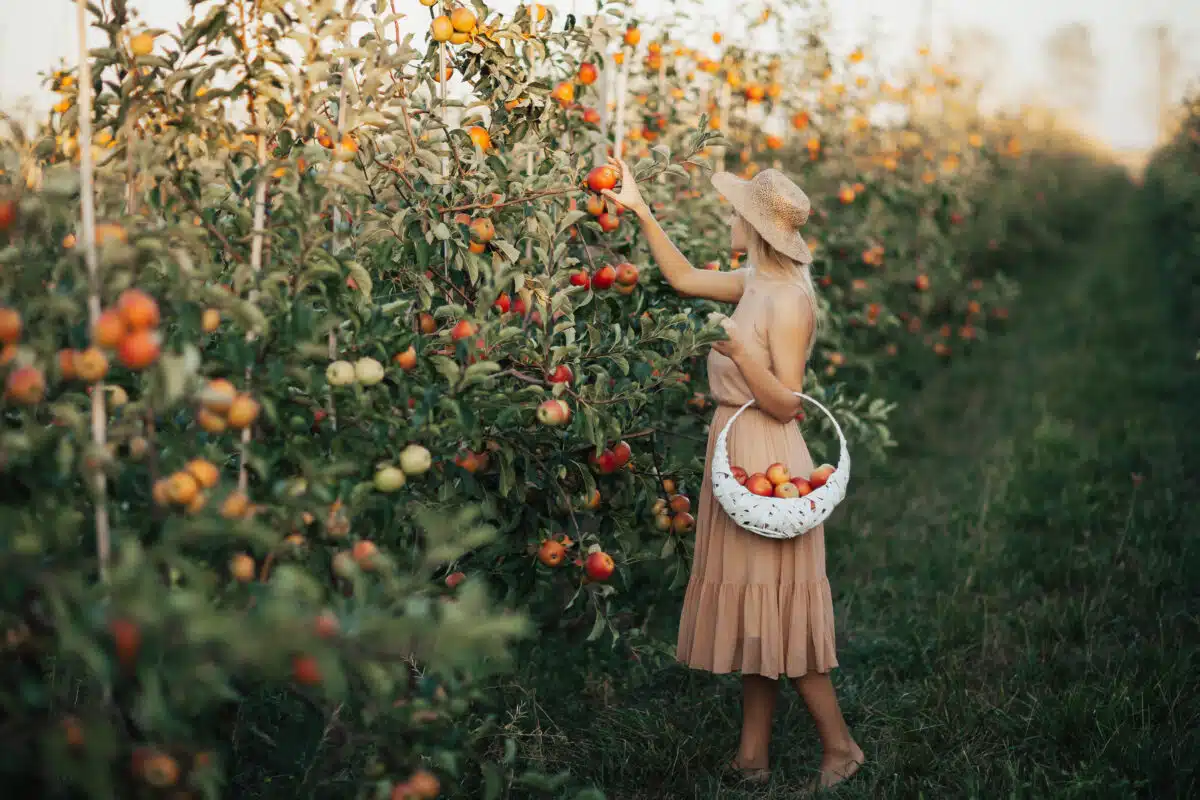
“The Apple Tree (The Adventures Of Seumas Beg)” by James Stephens
I was hiding in the crooked apple tree,
Scouting for Indians, when a man came;
I thought it was an Indian, for he
Was running like the wind., There was a flame
Of sunlight on his hand as he drew near,
And then I saw a knife gripped in his fist.
He panted like a horse; his eyes were queer,
Wide-open, staring frightfully, and, hist!
His mouth stared open like another eye,
And all his hair was matted down with sweat.
I crouched among the leaves for fear he’d spy
Where I was hiding, so he did not get
His awful eyes on me, but like the wind
He fled as if he heard something behind.
“Apples Growing” by Will Carleton
Underneath an apple-tree
Sat a dame of comely seeming,
With her work upon her knee,
And her great eyes idly dreaming.
O’er the harvest-acres bright,
Came her husband’s din of reaping;
Near to her, an infant wight
Through the tangled grass was creeping.
On the branches long and high,
And the great green apples growing,
Rested she her wandering eye,
With a retrospective knowing.
“This,” she said, “the shelter is,
Where, when gay and raven-headed,
I consented to be his,
And our willing hearts were wedded.
“Laughing words and peals of mirth,
Long are changed to grave endeavor;
Sorrow’s winds have swept to earth
Many a blossomed hope forever.
Thunder-heads have hovered o’er–
Storms my path have chilled and shaded;
Of the bloom my gay youth bore,
Some has fruited–more has faded.”
Quickly, and amid her sighs,
Through the grass her baby wrestled,
Smiled on her its father’s eyes,
And unto her bosom nestled.
And with sudden, joyous glee,
Half the wife’s and half the mother’s,
“Still the best is left,” said she:
“I have learned to live for others.”
“The Cherry Tree (The Adventures Of Seumas Beg)” by James Stephens
Come from your bed my drowsy gentleman!
And you, fair lady, rise and braid your hair,
And let the children wash, if wash they can;
If not, assist you them, and make them fair
As is the morning and the morning sky,
And every tree and bush and bird in air.
The sun climbed on the heights three hours ago,
He laughed above the hills and they were glad;
With bubbled pearl he made the rivers flow
And laced their mists in silver, and he clad
The meads in fragrant pomp of green and gold,
And bade the world forget it had been sad.
So lift yourself, good sir! and you, sweet dame,
Unlash your evening eyes of pious grey;
Call on the children by each loved name,
And set them on the grass and let them play;
And play with them a while, and sing with them
Beneath the cherry bush a roundelay.
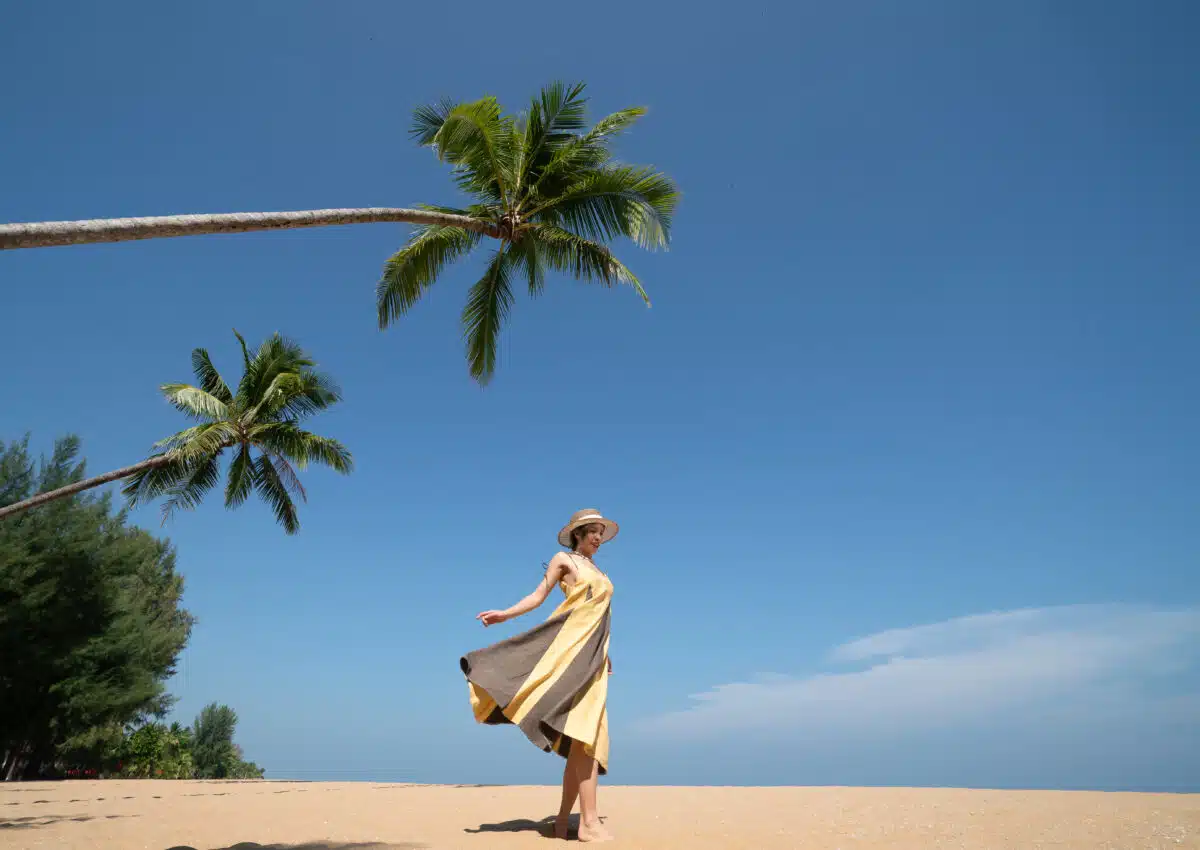
“The Tree of Life” by Susan Richards
The tree of life stands in the city of God;
Twelve manner of fruits it doth bear;
Its evergreen leaves, when scattered abroad,
For healing the nations appear.
Redeemed ones feast on that wonderful tree,
And dwell in its shade over there;
But it yieldeth its fruit for you and for me
Each month of our pilgrimage year.
There is fruit for the month of repentance,
When with tears the eyes overflow;
And there’s fruit for the month of acceptance,
When pardon the spirit doth know.
There is fruit for the month of temptation,
When faith bids the tempter to cease;
And there’s fruit for the month of salvation—
Constant trust, which bringeth forth peace.
There is fruit for the months of trouble and grief,
Months of conflict, trial, and care,
When the joy of the Lord giveth glad relief,
And strength every burden to bear.
Fruit for the months of affliction and sorrow.
Yes; there’s comfort for every breath.
Each sweet promise tells of a brighter morrow
Blessed rest, in the month of death.
Oh, those fruits for the soul, of pardon, and peace,
Faith, hope, and a sanctified love,
Courage, patience, trust, joy, rest, comfort, and bliss
From that beautiful tree up above!
The yield of this glorious tree cannot fail;
No worm ever gnaws at its root;
No blighting storms over that land can prevail,
To wither its life-giving fruit.
Oh, wonderful tree in the city of love!
Whenever I’m weary, distrest,
My soul takes its wing, and flies up above,
Beneath its wide branches to rest.
I gaze on its beauty; I eat of its fruit;
And in its rich foliage I see,
Clustering together, a little white group,
Who are waiting up there for me.
Dear Saviour, whenever the time shall come
Thou sendest a message for me,
Oh, give me to rest in a sweet, sweet home,
Just under that beautiful tree!
“Most Haste, Worse Speed” by Grace Rhys
Oh, dear, dear, what can the matter be?
Two women up in an apple tree;
One down, too quick in her flight, d’ye see?
But t’other came down more leisurely.
“The Planting Of The Apple-Tree” by William Cullen Bryant
Come, let us plant the apple-tree.
Cleave the tough greensward with the spade;
Wide let its hollow bed be made;
There gently lay the roots, and there
Sift the dark mould with kindly care,
And press it o’er them tenderly,
As, round the sleeping infant’s feet,
We softly fold the cradle- sheet;
So plant we the apple-tree.
hat plant we in this apple-tree?
Buds, which the breath of summer days
Shall lengthen into leafy sprays;
Boughs where the thrush, with crimson breast,
Shall haunt and sing and hide her nest;
We plant, upon the sunny lea,
A shadow for the noontide hour,
A shelter from the summer shower,
When we plant the apple-tree.
What plant we in this apple-tree?
Sweets for a hundred flowery springs
To load the May-wind’s restless wings,
When, from the orchard-row, he pours
Its fragrance through our open doors;
A world of blossoms for the bee,
Flowers for the sick girl’s silent room,
For the glad infant sprigs of bloom,
We plant with the apple-tree.
What plant we in this apple-tree?
Fruits that shall swell in sunny June,
And redden in the August noon,
And drop, when gentle airs come by,
That fan the blue September sky,
While children come, with cries of glee,
And seek them where the fragrant grass
Betrays their bed to those who pass,
At the foot of the apple-tree.
And when, above this apple-tree,
The winter stars are quivering bright,
And winds go howling through the night,
Girls, whose young eyes o’erflow with mirth.
Shall peel its fruit by cottage-hearth,
And guests in prouder homes shall see,
Heaped with the grape of Cintra’s vine
And golden orange of the line,
The fruit of the apple-tree.
The fruitage of this apple-tree
Winds and our flag of stripe and star
Shall bear to coasts that lie afar,
Where men shall wonder at the view,
And ask in what fair groves they grew;
And sojourners beyond the sea
Shall think of childhood’s careless day,
And long, long hours of summer play,
In the shade of the apple-tree.
Each year shall give this apple-tree
A broader flush of roseate bloom,
A deeper maze of verdurous gloom,
And loosen, when the frost- clouds lower,
The crisp brown leaves in thicker shower.
The years shall come and pass, but we
Shall hear no longer, where we lie,
The summer’s songs, the autumn’s sigh,
In the boughs of the apple-tree.
And time shall waste this apple-tree.
Oh, when its aged branches throw
Thin shadows on the ground below,
Shall fraud and force and iron will
Oppress the weak and helpless still?
What shall the tasks of mercy be,
Amid the toils, the strifes, the tears
Of those who live when length of years
Is wasting this little apple-tree?
“Who planted this old apple-tree? ”
The children of that distant day
Thus to some aged man shall say;
And, gazing on its mossy stem,
The gray-haired man shall answer them:
“A poet of the land was he,
Born in the rude but good old times;
“Tis said he made some quaint old rhymes,
On planting the apple-tree.”
Fruit Poems That Rhyme
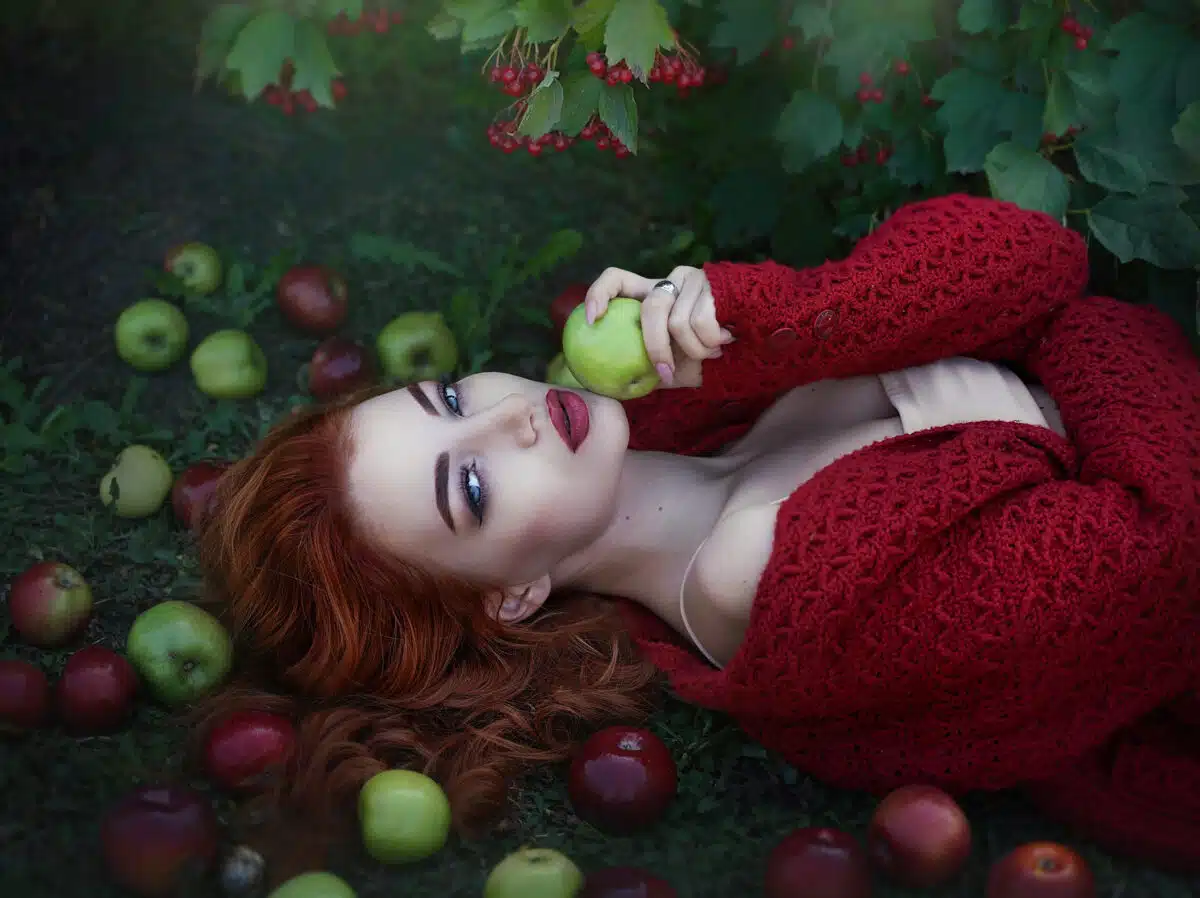
“To Autumn” by John Keats
1.
Season of mists and mellow fruitfulness,
Close bosom-friend of the maturing sun;
Conspiring with him how to load and bless
With fruit the vines that round the thatch-eves run;
To bend with apples the moss’d cottage-trees,
And fill all fruit with ripeness to the core;
To swell the gourd, and plump the hazel shells
With a sweet kernel; to set budding more,
And still more, later flowers for the bees,
Until they think warm days will never cease,
For Summer has o’er-brimm’d their clammy cells.
2.
Who hath not seen thee oft amid thy store?
Sometimes whoever seeks abroad may find
Thee sitting careless on a granary floor,
Thy hair soft-lifted by the winnowing wind;
Or on a half-reap’d furrow sound asleep,
Drows’d with the fume of poppies, while thy hook
Spares the next swath and all its twined flowers:
And sometimes like a gleaner thou dost keep
Steady thy laden head across a brook;
Or by a cyder-press, with patient look,
Thou watchest the last oozings hours by hours.
3.
Where are the songs of Spring? Ay, where are they?
Think not of them, thou hast thy music too,
While barred clouds bloom the soft-dying day,
And touch the stubble- plains with rosy hue;
Then in a wailful choir the small gnats mourn
Among the river sallows, borne aloft
Or sinking as the light wind lives or dies;
And full-grown lambs loud bleat from hilly bourn;
Hedge-crickets sing; and now with treble soft
The red-breast whistles from a garden- croft;
And gathering swallows twitter in the skies.
“The Peach” by Mrs. Leicester
Mamma gave us a single peach,
She shared it among seven;
Now you may think that unto each
But a small piece was given.
Yet though each share was very small,
We own’d when it was eaten,
Being so little for us all
Did its fine flavour heighten.
The tear was in our parent’s eye,
It seem’d quite out of season;
When we ask’d wherefore she did cry,
She thus explain’d the reason.
“The cause, my children, I may say,
Was joy, and not dejection;
The Peach, which made you all so gay,
Gave rise to this reflection:—
‘It’s many a mother’s lot to share,
Seven hungry children viewing,
A morsel of the coarsest fare,
As I this Peach was doing.”
“No One Will See Me” from Rhymes Worth Remembering
“No one will see me,” said little John Day,
For his father and mother were out of the way,
And he was at home all alone;
“No one will see me;” so he climb’d on a chair,
And peep’d in the cupboard to spy what was there,
Which, of course, he ought not to have done.
There stood in the cupboard, so sweet and so nice,
A plate of plum-cake in full many a slice,
And apples so ripe and so fine ;
“Now no one will see me,” said John to himself,
As he stretch’d out his arm to reach up to the shelf:
” This apple at least shall be mine.”
John paused, and put back the nice apple so red,
For he thought of the words his kind mother had said,
When she left all these things in his care;
“And no one will see me,” thought he, “is not true
For I’ve read that God sees us in all that we do,
And is with us everywhere. “
Well done, John; your father and mother obey,
Try ever to please them, and mind what they say,
Even when they are absent from you;
And never forget, that, though no one be nigh,
You cannot be hid from the glance of God’s eye,
Who notices all that you do.
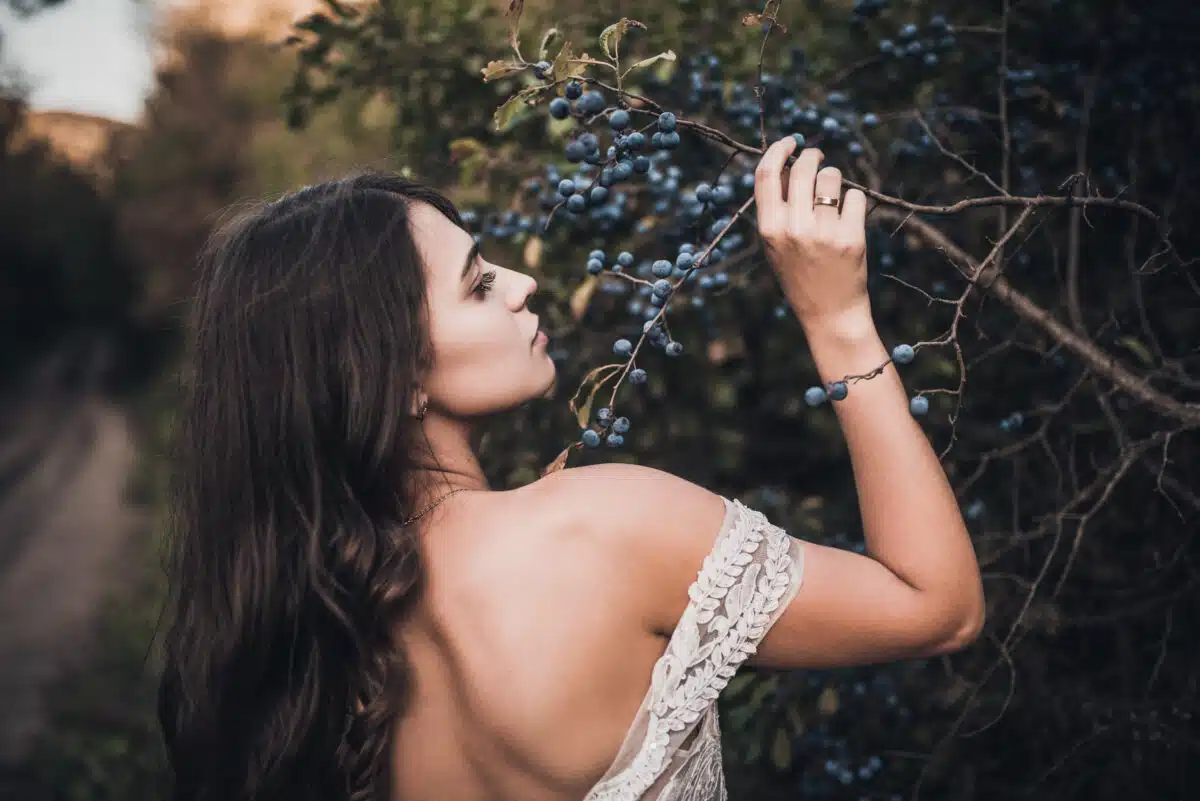
From “Blueberries” by Robert Lee Frost
“You ought to have seen what I saw on my way
To the village, through Mortenson’s pasture to-day:
Blueberries as big as the end of your thumb,
Real sky-blue, and heavy, and ready to drum
In the cavernous pail of the first one to come!
And all ripe together, not some of them green
And some of them ripe! You ought to have seen!”
“I don’t know what part of the pasture you mean.”
“You know where they cut off the woods, let me see,
It was two years ago, or no!, can it be
No longer than that?, and the following fall
The fire ran and burned it all up but the wall.”
“Why, there hasn’t been time for the bushes to grow.
That’s always the way with the blueberries, though:
There may not have been the ghost of a sign
Of them anywhere under the shade of the pine,
But get the pine out of the way, you may burn
The pasture all over until not a fern
Or grass-blade is left, not to mention a stick,
And presto, they’re up all around you as thick
And hard to explain as a conjuror’s trick.”
“Song Of The Strawberry Girl” by Anonymous
It is summer! it is summer! how beautiful it looks;
There is sunshine on the old grey hills, and
sunshine on the brooks;
A singing-bird on every bough, soft perfumes on the air,
A happy smile on each young lip, and gladness every
where!
Oh! is it not a pleasant thing to wonder through the
woods,
To look upon the painted flowers, and watch the opening buds;
Or seated in the deep cool shade, at some tall ash tree’s root,
To fill my little basket with the sweet and scented
fruit?
They tell me that my father’s poor – that is no grief
to me,
When such a blue and brilliant sky my upturned eye
can see;
They tell me, too, that richer girls can sport with toy and gem ;
It may be so – and yet, methinks, I do not envy them.
When forth I go upon my way, a thousand toys are
mine,
The clusters of dark violets, the wreaths of the wild
vine;
My jewels are the primrose pale, the bind-weed, and
the rose;
And show me any courtly gem more beautiful than
those.
And then the fruit! the glowing fruit! how sweet the
scent it breathes!
I love to see its crimson cheek rest on the bright green
leaves!
Summer’s own gift of luxury, in which the poor may share,
The wild-wood fruit my eager eye is seeking everywhere.
Oh! summer is a pleasant time, with all its sounds
and sights;
Its dewy mornings, balmy eves, and tranquil calm
delights;
I sigh when first I see the leaves fall yellow on the plain, .
And all the winter long I sing .– ” Sweet summer come
again!”
“Autumn” by Mrs. Hawtrey
Golden Autumn comes again,
With its storms of wind and rain,
With its fields of yellow grain.
Gifts for man, and bird, and brute,
In its wealth of luscious fruit,
In its store of precious root.
Trees bend down with plum and pear,
Rosy apples scent the air,
Nuts are ripening everywhere.
Thro’ the lanes where “bindweed” weaves
Graceful wreaths of clustering leaves,
Home the reapers bear the sheaves.
Singing loud their harvest song,
In their hearty rustic tongue
Singing gaily, old and young.
Singing loud beside the wain,
With its load of bursting grain,
Dropping all along the lane.
Mice and ant and squirrel fill
Now their garners at their will,
Only drones need hunger still.
Flocks of sparrows downward fly
From their hawthorn perch on high,
Pecking each one greedily.
Though the Summer flowers are dead,
Still the poppy rears its head,
Flaunting gaily all in red.
Still the daisy, large and white,
Shining like a star at night,
In the hedge-row twinkles bright.
Still the ” Traveller’s Joy” is seen,
Snowy white, o’er leaves of green,
Glittering in its dewy sheen.
Still the foxglove’s crimson bell,
And the fern – leaves in the dell,
Autumn’s parting beauty tell.
Purple sunsets, crimson leaves,
Fruit and flowers and golden sheaves,
Autumn gives us ere she leaves.
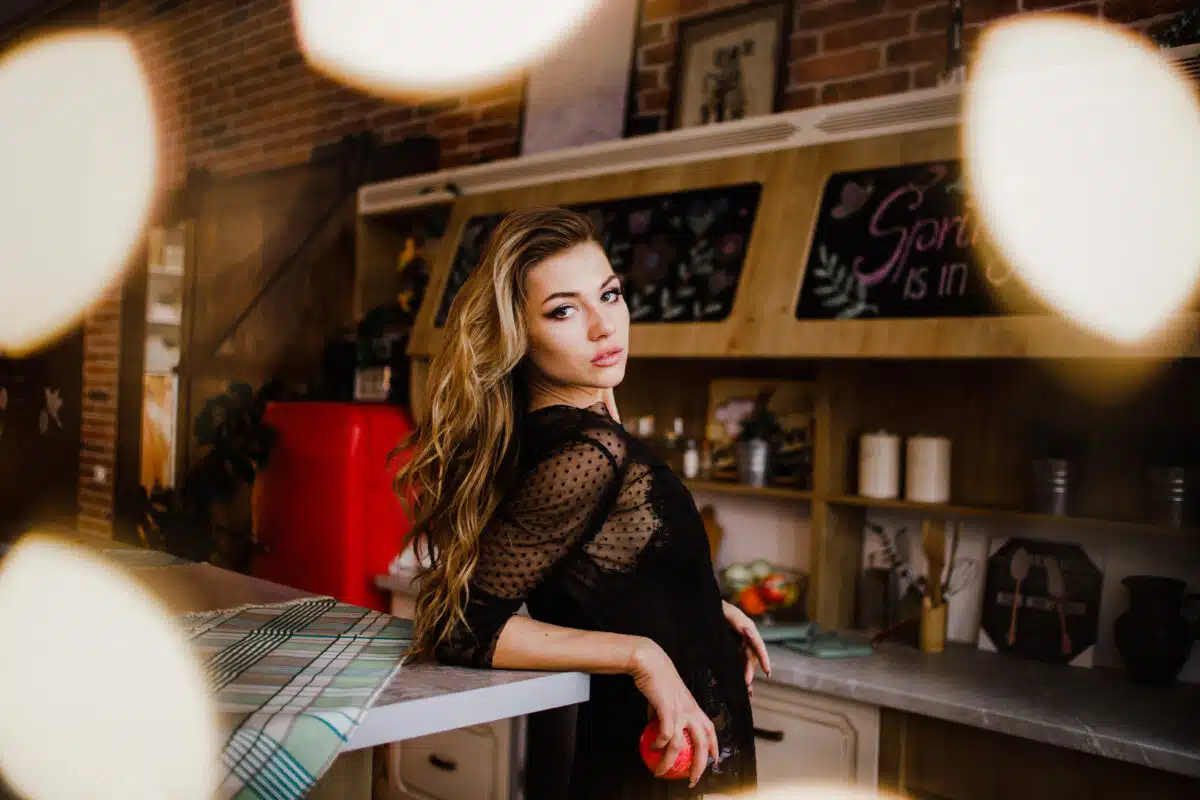
“Lines on the Mermaid Tavern” by John Keats
Choicer than the Mermaid Tavern?
Have ye tippled drink more fine
Than mine host’s Canary wine?
Or are fruits of Paradise
Sweeter than those dainty pies
Of venison? O generous food!
Drest as though bold Robin Hood
Would, with his maid Marian,
Sup and bowse from horn and can.
I have heard that on a day
Mine host’s sign-board flew away,
Nobody knew whither, till
An astrologer’s old quill
To a sheepskin gave the story,
Said he saw you in your glory,
Underneath a new old sign
Sipping beverage divine,
And pledging with contented smack
The Mermaid in the Zodiac.
Souls of Poets dead and gone,
What Elysium have ye known,
Happy field or mossy cavern,
Choicer than the Mermaid Tavern?
“The Fruit-Gift” by John Greenleaf Whittier
Last night, just as the tints of autumn’s sky
Of sunset faded from our hills and streams,
I sat, vague listening, lapped in twilight dreams,
To the leaf’s rustle, and the cricket’s cry.
Then, like that basket, flush with summer fruit,
Dropped by the angels at the Prophet’s foot,
Came, unannounced, a gift of clustered sweetness,
Full-orbed, and glowing with the prisoned beams
Of summery suns, and rounded to completeness
By kisses of the south-wind and the dew.
Thrilled with a glad surprise, methought I knew
The pleasure of the homeward-turning Jew,
When Eshcol’s clusters on his shoulders lay,
Dropping their sweetness on his desert way.
I said, “This fruit beseems no world of sin.
Its parent vine, rooted in Paradise,
O’ercrept the wall, and never paid the price
Of the great mischief,—an ambrosial tree,
Eden’s exotic, somehow smuggled in,
To keep the thorns and thistles company.”
Perchance our frail, sad mother plucked in haste
A single vine-slip as she passed the gate,
Where the dread sword alternate paled and burned,
And the stern angel, pitying her fate,
Forgave the lovely trespasser, and turned
Aside his face of fire; and thus the waste
And fallen world hath yet its annual taste
Of primal good, to prove of sin the cost,
And show by one gleaned ear the mighty harvest lost.
From “The Ballad of Baby Bell” by Thomas Bailey Aldrich
And now the orchards, which were white
And red with blossoms when she came,
Were rich in autumn’s mellow prime.
The clustered apples burnt like flame,
The soft-cheeked peaches blushed and fell,
The ivory chestnut burst its shell,
The grapes hung purpling in the grange;
And time wrought just as rich a change
In little Baby Bell.
Her lissome form more perfect grew,
And in her features we could trace,
In softened curves, her mother’s face!
Her angel-nature ripened too.
We thought her lovely when she came,
But she was holy, saintly now:
Around her pale angelic brow
We saw a slender ring of flame!
Poems About Fruits and Vegetables
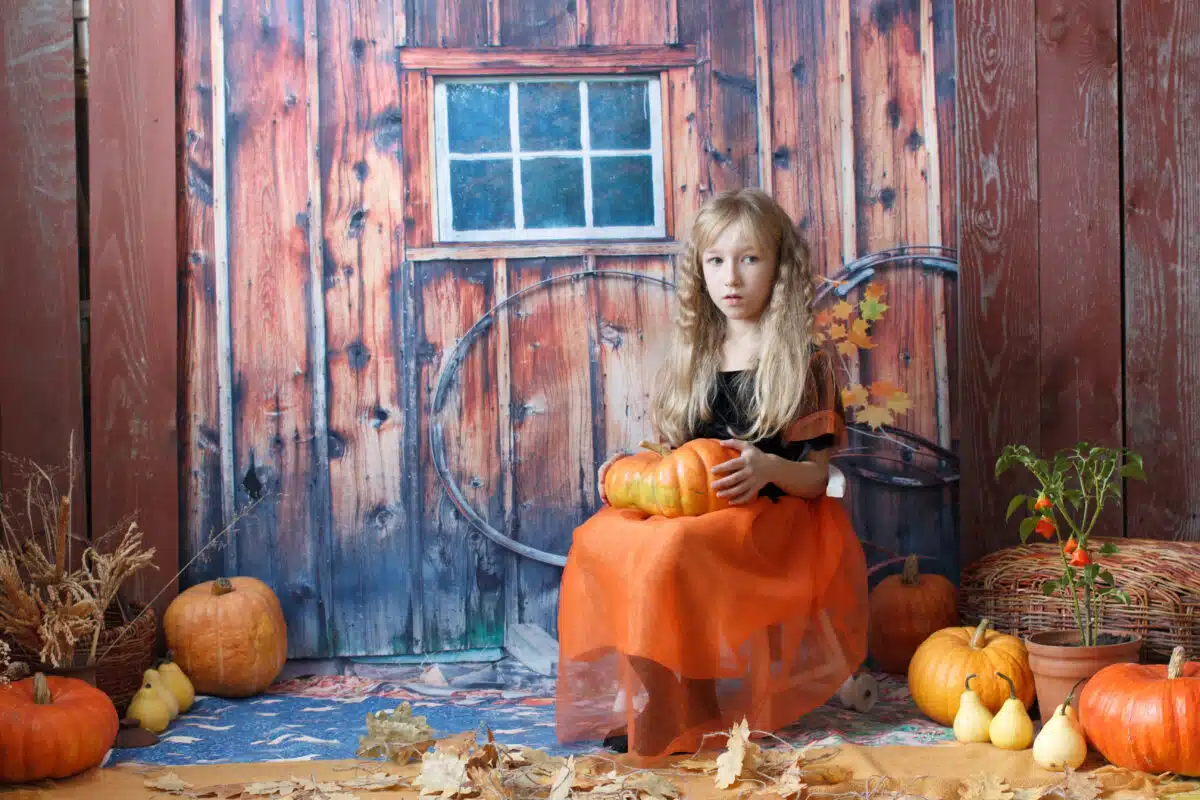
“Oranges” by Jonathan Swift
Come buy my fine oranges, sauce for your veal,
And charming, when squeezed in a pot of brown ale;
Well roasted, with sugar and wine in a cup,
They’ll make a sweet bishop when gentlefolks sup.
“Berries” by Walter De La Mare
There was an old woman
Went blackberry picking
Along the hedges
From Weep to Wicking.
Half a pottle-—
No more she had got ,
When out steps a Fairy
From her green grot;
And says , “Well , Jill ,
Would ‘ ee pick ‘ ee mo?”
And Jill , she curtseys,
And looks just so.
” Be off , “says the Fairy,
As quick as you can ,
Over the meadows
To the little green lane ,
That dips to the hayfields
Of Farmer Grimes:
I’ve berried those hedges
A score of times;
Bushel on bushel
I’ll promise ‘ ee, Jill,
This side of supper
If ‘ ee pick with a will.”
She glints very bright,
And speaks her fair;
Then lo , and behold!
She has faded in air.
Be sure old Goodie
She trots betimes
Over the meadows
To Farmer Grimes .
And never was queen
With jewellry rich
As those same hedges
From twig to ditch;
Like Dutchmen’s coffers ,
Fruit , thorn , and flower —
They shone like William
And Mary’s bower.
And be sure Old Goodie
Went back to Weep ,
So tired with her basket
She scarce could creep .
When she comes in the dusk
To her cottage door,
There’s Towser wagging
As never before,
To see his Missus
So glad to be
Come from her fruit picking
Back to he.
As soon as next morning
Dawn was grey ,
The pot on the hob
Was simmering away;
And all in a stew
And a hugger – mugger
Towser and Jill
A – boiling of sugar,
And the dark clear fruit
That from Faërie came ,
For syrup and jelly
And blackberry jam.
Twelve jolly gallipots
Jill put by;
And one little teeny one ,
One inch high;
And that she’s hidden
A good thumb deep,
Half way over
From Wicking to Weep.
“Oranges & Lemons” by Walter Crane
Oranges and lemons, says the bells of St. Clemen’s;
You owe me five farthings, says the bells of St. Martin’s;
When will you pay me, says the bells of Old Bailey;
When I grow rich, says the bells of Shoreditch;
When will that be? says the bells of Stepney;
I do not know, says the great bell of Bow.
Here comes a candle to light you to bed,
And here comes a chopper to chop off your head.
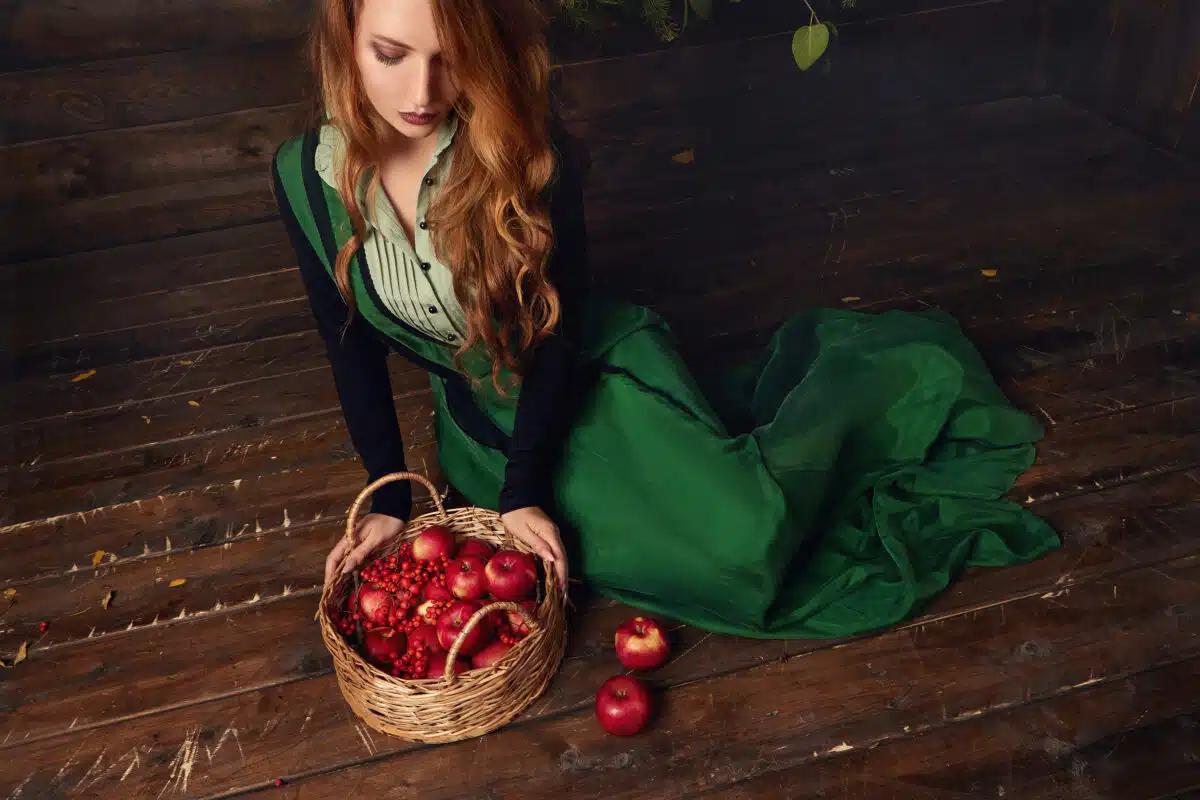
“Berrying” by Ralph Waldo Emerson
“May be true what I had heard,
Earth’s a howling wilderness
Truculent with fraud and force,”
Said I, strolling through the pastures,
And along the riverside.
Caught among the blackberry vines,
Feeding on the Ethiops sweet,
Pleasant fancies overtook me:
I said, “What influence me preferred
Elect to dreams thus beautiful?”
The vines replied, “And didst thou deem
No wisdom to our berries went?”
“Plums & Vine” by Paul Cameron Brown
Plums and vine (as the Atlantic is green)
intone the heavy church wall
with errant sprigs, so Heaven sent
they are big with earthly passion
racing for the sky.
Madonna Poverta in her midst
with the pulpit clutching Light –
so gnarled, like bush, that each crevice
reeks with stone
all stooped under such worldly avarice.
“The Joy of Heaven” by Robert Caldwell
I.
Say not that the blest in heaven
Are from nature’s longings free;
That they never know what hunger,
Never know what thirst may be.
II.
Rather say that when the blessed
Feel the sweet desire for more,
There will be an ever ready
And an ever ample store.
III.
For the flowers are ever lovely
In the land where angels roam;
And full-breasted are the rivers
Flowing through the heavenly home.
IV.
Trees of beanty line the valleys
Trees for ever fresh and green—
And upon their glorious branches
Varied fruits are ever seen.
V.
Every month such precious clusters
Ripen on each sacred tree;
If the leaves can heal the nations,
Oh how sweet the fruit must be?
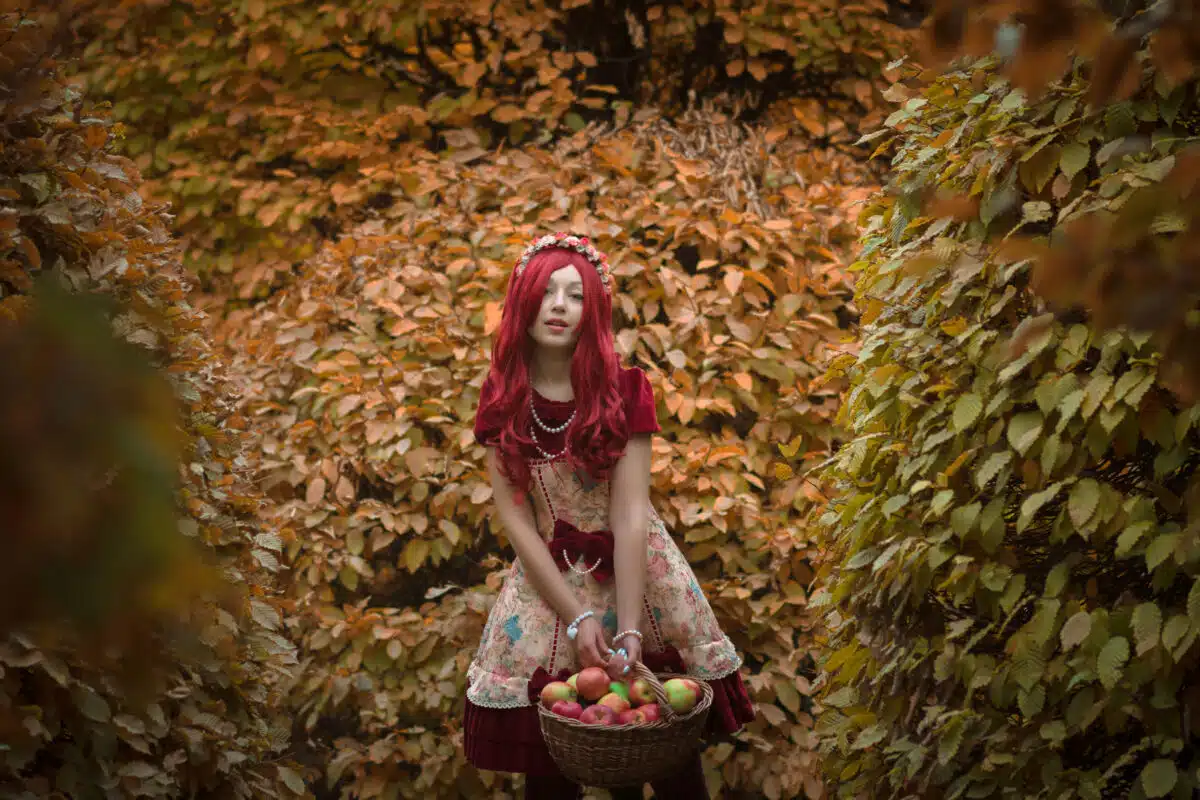
From “To An Absent Sister” by Sylvanus Dryden Phelps
When Autumn’s fruits of golden hue,
The bounteous year had crowned,
We roamed the fragrant orchards through,
Where plenty smiled around:
And oft we joined companions gay,
In scenes of cheerful mirth;
And when bleak winter held his sway,
Met parents round the hearth.
“Artichoke” by Elizabeth Gordon
Young California Artichoke
Exclaimed: “It is the richest joke
That many people, young and old,
How to eat me must be told!”
“White Turnip” by Elizabeth Gordon
White Turnip said: “I’m pale, I know
And all our family are so.”
“I should advise,” said old White Beet,
“A course of sugar cakes to eat.”
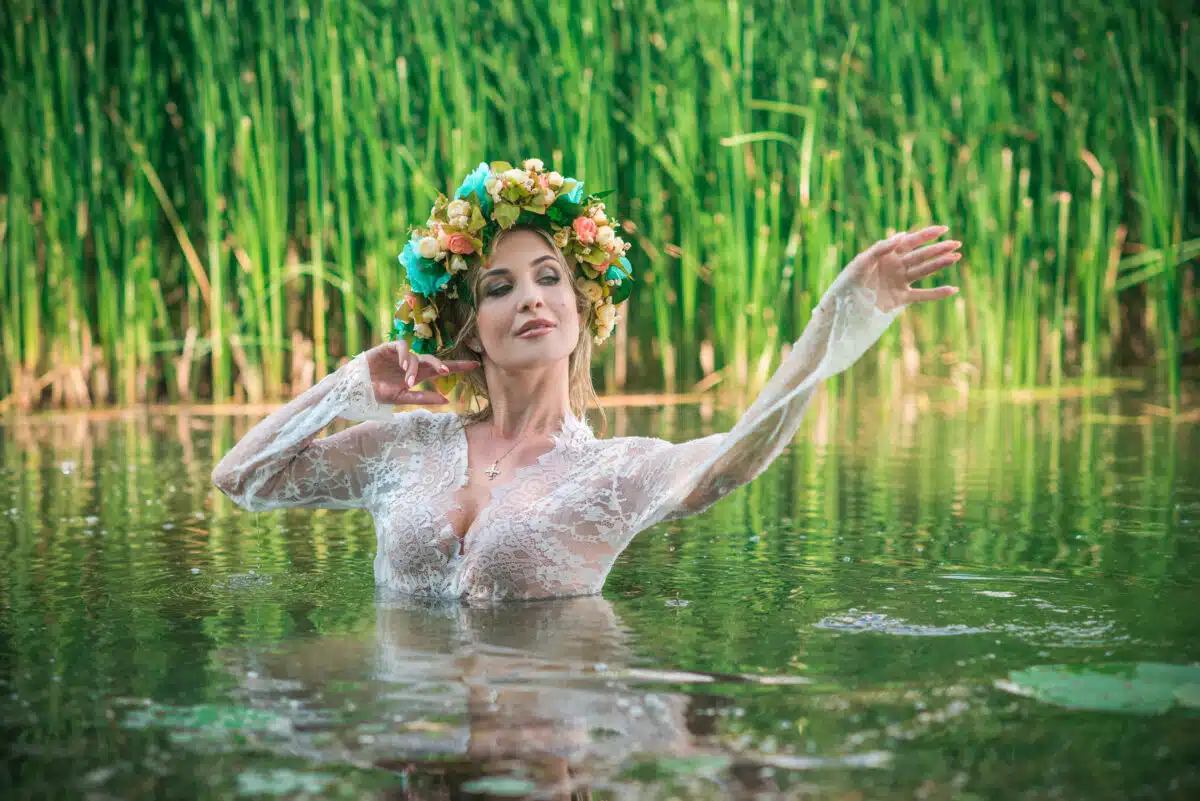
“Water Cresses” by Elizabeth Gordon
The dainty little Water Cresses,
In their pretty bathing dresses,
Like water fairies splash and play
In the cool brooklet all the day.
